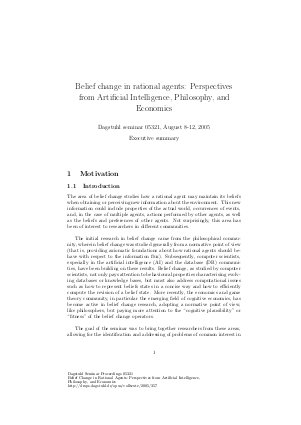05321 Executive Summary – Belief Change in Rational Agents: Perspectives from Artificial Intelligence, Philosophy, and Economics
Authors James Delgrande, Jérôme Lang, Hans Rott, Jean-Marc Tallon
-
Part of:
Volume:
Dagstuhl Seminar Proceedings, Volume 5321
Part of: Series: Dagstuhl Seminar Proceedings (DagSemProc) - License:
 Creative Commons Attribution 4.0 International license
Creative Commons Attribution 4.0 International license
- Publication Date: 2005-11-22
File

PDF
DagSemProc.05321.3.pdf
- Filesize: 93 kB
- 5 pages
Document Identifiers
Subject Classification
Keywords
- Belief revision
- iterated belief revision
- update
- merging
- dynamic logic
- possibility theory
- conditionals
- social choice
- distance
- complexity
Metrics
- Access Statistics
-
Total Accesses (updated on a weekly basis)
0Document
0Metadata
Abstract
The area of belief change studies how a rational agent may maintain its beliefs when obtaining or perceiving new information about the environment. This new information could include properties of the actual world, occurrences of events, and, in the case of multiple agents, actions performed by other agents, as well as the beliefs and preferences of other agents. Not surprisingly, this area has been of interest to researchers in different communities. The initial research in belief change came from the philosophical community, wherein belief change was studied generally from a normative point of view (that is, providing axiomatic foundations about how rational agents should behave with respect to the information flux). Subsequently, computer scientists, especially in the artificial intelligence (AI) and the database (DB) communities, have been building on these results. Belief change, as studied by computer scientists, not only pays attention to behavioural properties characterising evolving databases or knowledge bases, but must also address computational issues such as how to represent beliefs states in a concise way and how to efficiently compute the revision of a belief state. More recently, the economics and game theory community, in particular the emerging field of cognitive economics, has become active in belief change research, adopting a normative point of view, like philosophers, but paying more attention to the ''cognitive plausibility'' or ''fitness'' of the belief change operators. The goal of the seminar was to bring together researchers from these areas, allowing for the identification and addressing of problems of common interest in this area, as well as providing a means to explore ways in which one area may contribute to another.
Cite As Get BibTex
James Delgrande, Jérôme Lang, Hans Rott, and Jean-Marc Tallon. 05321 Executive Summary – Belief Change in Rational Agents: Perspectives from Artificial Intelligence, Philosophy, and Economics. In Belief Change in Rational Agents: Perspectives from Artificial Intelligence, Philosophy, and Economics. Dagstuhl Seminar Proceedings, Volume 5321, pp. 1-5, Schloss Dagstuhl – Leibniz-Zentrum für Informatik (2005)
https://doi.org/10.4230/DagSemProc.05321.3
BibTex
@InProceedings{delgrande_et_al:DagSemProc.05321.3,
author = {Delgrande, James and Lang, J\'{e}r\^{o}me and Rott, Hans and Tallon, Jean-Marc},
title = {{05321 Executive Summary – Belief Change in Rational Agents: Perspectives from Artificial Intelligence, Philosophy, and Economics}},
booktitle = {Belief Change in Rational Agents: Perspectives from Artificial Intelligence, Philosophy, and Economics},
pages = {1--5},
series = {Dagstuhl Seminar Proceedings (DagSemProc)},
ISSN = {1862-4405},
year = {2005},
volume = {5321},
editor = {James Delgrande and Jerome Lang and Hans Rott and Jean-Marc Tallon},
publisher = {Schloss Dagstuhl -- Leibniz-Zentrum f{\"u}r Informatik},
address = {Dagstuhl, Germany},
URL = {https://drops.dagstuhl.de/entities/document/10.4230/DagSemProc.05321.3},
URN = {urn:nbn:de:0030-drops-3577},
doi = {10.4230/DagSemProc.05321.3},
annote = {Keywords: Belief revision, iterated belief revision, update, merging, dynamic logic, possibility theory, conditionals, social choice, distance, complexity}
}
